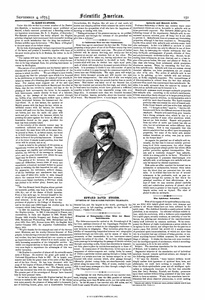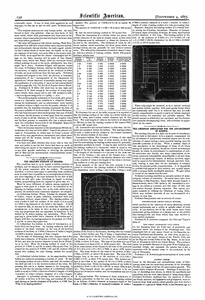< Rosicrucianism in New York (continued from page 1-54) >
… Russian baroness ?!! Madame H. P. De Blavatsky
… Nature’s duality trinity; Romanism...
Written by Rev. DR Wiggin. This article provoked itre wisth of that Rev DR Bellows; hence he wrote another one, on “Sorcery and Necromancy” and pitched into us.
# On that evening the first idea of the Theos. Society was discussed.
For a much better account see a quotation on p. 296 in E. H. Britten's Nineteenth Century Miracles ... 1883[1]
The Spiritual Scientist
Most of the organs of the spiritualists in this country are filled with insipid ghost matter, very tiresome and useless to all whose brains have not been softened by the spirit craze. The Spiritual Scientist, a neatly printed weekly periodical, is an exception. Its editorial columns exhibit talent, while its conductors, with a boldness quite remarkable for a spirit paper, actually condemn, as unworthy of true believers, the printing and circulation of the unauthenticated trashy stuff delivered by common mediums. To its cotemporary the Banner of Light, it administers a severe rebuke for its agency in this matter, and alleges that for the past ten or twelve years that journal has poured out a weekly stream of pretended spirit communications, of which not more than two in a hundred had any evidence of being genuine, or contained anything beyond childish nonsense, the merest babbings of infancy. It thinks the time has now come to substitute the intelligent speech of adolescence, which it accordingly undertakes to do in its next article.
Subject: The American Association for the Advancement of Science, now in session at Detroit.
Disgraceful behavior of the Association and of individual members thereof, towards spiritual science, are charged on the following specifications:
" If," says the Scientist, " these learned children would simply confess their ignorance of spiritual facts, laws, and philosophy, we could have nothing to complain of. But what the whole spiritualistic press and all intelligent spiritualists so indignantly denounce is the fact that scientific men, like Davy, Faraday, Tyndall, and Huxley, pronounce upon these matters without being possessed of any data upon which to form an opinion. Worse, they sometimes have deliberately lied about observed phenomena, to avoid making a favorable report. If any of them feels aggrieved at our language, let him say so, and we will prove its literal accuracy."
" The helpless creatures are only human moles. As they burrow in their ' dim galleries,' what can they know of the inner world, which their predecessors only discovered at the moment when communication was interrupted between them and their fellow grubbers?"
" See what will happen at this Detroit meeting: Their Entomological Club will have heated debate upon trapdoor spiders, and acrimoniously discuss whether the male mygale avicularia has a darker shade of brown than the female on the upper segment of the body, and more ciliae to the square inch; after which, as an appetizer for dinner (champagne and fixings on the lake), mention will be made of that Dismal Swamp louse, which (see Trans. 1874) the surveyors found always pointing its nose to the north, whichsoever way they might lay it down. Professor Hilgard will enquire, across the room, of Professor Dawson, whether the Myriapoda with two antennae, so highly esteemed by the scolopendra tribes of India, are more nutritious than the date palm. Professor Youmans will propose to the Club the election to honorary membership of the "correspondent of the Department of Agriculture" whose discovery of mortality among bots, upon the application of a decoction of tansy he had appropriately noticed at page 384, Vol. VII, No. 39 of Popular Science Monthly. Professor E. B. Elliot will show that he was right and Professor H. E. Davis wrong in the number of young lepidoptera which, when placed end to end will measure a mile, — the true figures being 0174 x b — y542½ = A'ss.
" The anthropological subsection will no doubt give prominence to a discussion upon measles as a religious element among the Andamanese; and an adjournment could hardly be reached without a fight over the old puzzle, whether it is probable that the American stovepipe represents the form of <... continues on page 1-56 >
Editor's notes
- ↑ Britten, Emma Hardinge, Nineteenth century miracles, or, Spirits and their work in every country of the earth : a complete historical compendium of the great movement known as "modern spiritualism" (read on Internet Archive). This book has several pages dedicated to The Theosophical Society.
- ↑ The Spiritual Scientist by Olcott, H. S., Scientific American, v. 33, No. 10, September 4, 1875, pp. 151-2. First idea of TS
Sources
-
HPB's note
-
Scientific American, v. 33, No. 10, September 4, 1875, p. 151
-
Scientific American, v. 33, No. 10, September 4, 1875, p. 152




